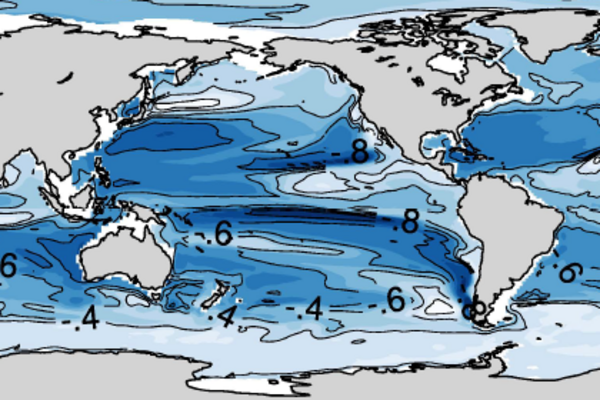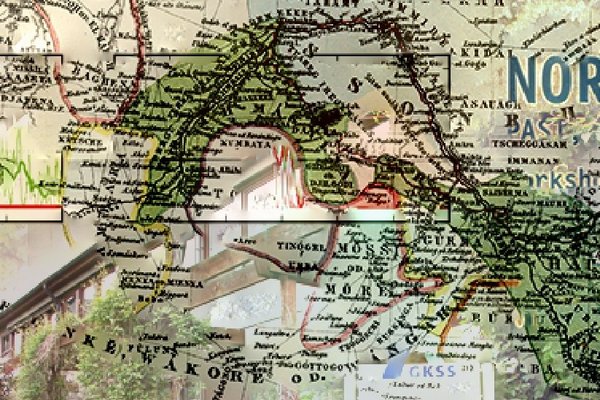
Tracking the fate of anthropogenic carbon in the ocean — Modeling the global 13C-Suess effect
Rising fossil-fuel CO2 emissions deplete the atmospheric concentrations of the heavy carbon isotope 13C. This phenomenon, called the 13C Suess…

Variations of tropical lapse rates in climate models and their implications for upper tropospheric warming
In a new study in the Journal of Climate Paul Keil, Hauke Schmidt, Bjorn Stevens and Jiawei Bao from the department “The Atmosphere in the Earth…
![[Translate to English:] [Translate to English:]](/fileadmin/_processed_/3/6/csm_Hasselmann_Klaus_Portrait_e4bec93d62.jpg)
Physics Nobel Prize 2021 for Klaus Hasselmann
Klaus Hasselmann, founding Director of the Max Planck Institute for Meteorology, receives the Nobel Prize in Physics 2021 together with Syukuro…
![[Translate to English:] [Translate to English:]](/fileadmin/_processed_/f/b/csm_210928_Photo_Tyrlis_d488fea61e.jpg)
Evangelos Tyrlis takes on professorship in Athens
Dr Evangelos Tyrlis, research scientist in the department "The Ocean in the Earth System" of the Max Planck Institute for Meteorology (MPI-M), has…

Fluid physics, turbulence and vegetation modeling: Martin Claussen and his research interests
After 16 years as Professor of Physical Meteorology at Universität Hamburg and as Director at the Max Planck Institute for Meteorology (MPI-M), Prof.…
![[Translate to English:] [Translate to English:]](/fileadmin/_processed_/b/c/csm_Stevens_EUREC4A_Abb19_49efa6962a.jpg)
Do clouds amplify global warming? EUREC4A field study tests hypothesized mechanisms
The science guiding the field campaign EUREC4A (Elucidating the role of clouds-circulation coupling in climate) and its measurements is presented in…
![[Translate to English:] [Translate to English:]](/fileadmin/_processed_/6/2/csm_fig_kleinen_35691d58ab.png)
Future methane concentration underestimated in climate change scenarios
In a new study in Environmental Research Letters Dr Thomas Kleinen and Prof Victor Brovkin, researchers at the Max Planck Institute for Meteorology…
![[Translate to English:] [Translate to English:]](/fileadmin/_processed_/c/a/csm_cloud_lat_6x4_067626074e.png)
Earth’s albedo and its symmetry
In an article appearing in AGU Advances, Dr. George Datseris and Prof. Bjorn Stevens provide an analysis of the Earth’s albedo, its surprising…

Are midlatitude weather and climate influenced by Arctic Amplification?
Many factors and regions can influence how the weather and the climate of the mid-latitudes may change under global warming. Particularly the…

The newest IPCC report – a look behind the scenes
A very personal account by Jochem Marotzke The just-published Assessment Report 6 (AR6) of the Intergovernmental Panel on Climate Change IPCC has…
![[Translate to English:] [Translate to English:]](/fileadmin/_processed_/2/0/csm_210810_Bild_fuer_P._Korn_problem_6x4_3c6d622b58.jpg)
Variational data assimilation – one problem less
In a new study in the Journal of Nonlinear Science Dr Peter Korn, scientist and group leader in the department “The Ocean in the Earth system” at the…
![[Translate to English:] [Translate to English:]](/fileadmin/_processed_/a/2/csm_IPCC_2021_Eyecatcher_5ff9ab1006.jpg)
New IPCC Assessment Report: Climate change widespread, rapid, and intensifying
How has climate changed up until the present? How will it change in the future? Questions like these are answered in the recently published first…
